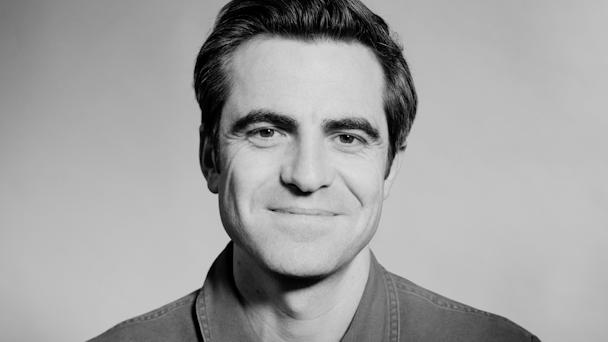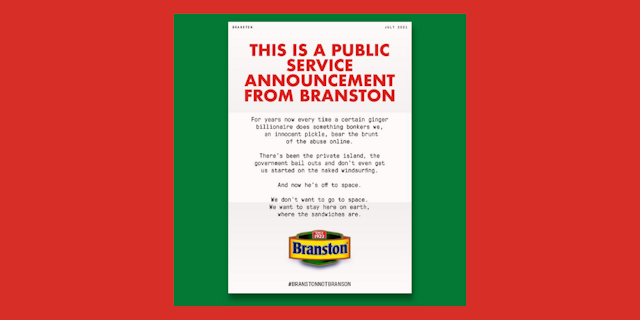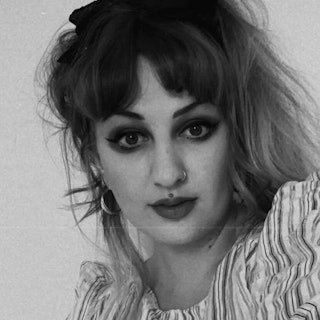My Creative Career: Aidan McClure, chief creative officer at Wonderhood Studios
Continuing our series profiling some of the ad industry’s finest creatives, the Wonderhood Studios co-founder Aidan McClure shares his origin story, which includes a Stefan Grappelli obsession, Tony Cullingham’s ad course and a John Lewis Christmas ad.

Wonderhood Studios' Aidan McClure
With a mother who wrote and illustrated children’s books and a father who restored paintings, it was pretty much inevitable that Aidan McClure’s life would be a creative one – something that a dyslexia diagnosis when he was seven cemented, nudging the youngster even further down an artistic path.
He credits his parents for spotting his learning difficulty early on and for providing the support he needed – and for allowing him to drop maths.
“I was a complete geek as a child,” he tells us. “I loved the violin. I was basically that kid out of About a Boy, but to make myself slightly cooler, I joined a jazz band.” And for a long time, McClure believed he was destined to become a musician, the French jazz violinist Stefan Grappelli his childhood hero.
Advertisement
Following his parents’ separation and his father’s remarriage, his new step-mum quickly identified huge gaps in his musical knowledge and, at the age of 12, started to buy him CDs by Bowie and the Stones, telling him he was “a complete desert when it comes to music.”
On leaving school, he was adamant he wasn’t going to art college and wanted to go down the degree route instead. He says that, growing up, his family didn’t have a “penny to their name” and he was “scared to death” of pursuing a creative career he couldn’t make a good income from.
He figured that an art history degree might allow him to be creative and earn money, but soon realized his mistake. “I remember thinking, ‘What the hell am I going to do with this degree, which I’m not massively enjoying?’ That drove me to find something within the creative space that I really found interesting.”
(He feels passionately that schools are doing a disservice to pupils by not showing the broad spectrum of career opportunities available to them, even leading kids to feel like failures for not becoming doctors and lawyers. He says that had he ever known that there were jobs in sound effects, for example, he would have pursued that. “I loved music and studied music for ages. And then I loved problem-solving. Sound effects is just a beautiful combination of those things, but I only discovered that when I did my first radio ad.”)
Advertisement
After his change of heart on art history, he went to the careers library at university and stumbled across books on advertising and copywriting. “The only ad agency I knew – which is the same for everyone – was Saatchi and Saatchi, so I just picked up the phone and spoke to a receptionist.”
With a promise to work for free to gain experience, he set his sights on the London shop. For two weeks, he spent his days in the agency and his nights on a family friend’s floor.
Two creatives, Matt Skolar and Philippe Fass, took the “snotty-nosed work experience kid” under their wing. “They sat in an office and stared out the window. They had these wicked ideas up on their wall. I was bowled over by the beautiful office. “(Skolar’s book, in particular, stuck with McClure and he says that only recently, when chatting with him recently, he was able to precisely relay what was in it, page after page, freaking Skolar out in the process.)
The best bit of advice McClure was given during that time was to go to Watford Ad School and work his “arse off” – something that wasn’t quite as easy as he initially thought, with 400 people applying for 12 places.
After panicking, he decided to take a year out instead, to work a few “crappy” jobs and get as much work together as he could, and then apply. “I got an interview. It was a complete disaster and I fucked it all up,” he recalls.
“Tony Cullingham [the legendary leader of the Watford Advertising Course] said that none of us deserved to be on the course, but he was going to set us one more question.” That question was to be answered over Christmas and was: How do you market the Royal Family?
The best answer would get a place at the coveted college and from the “pits of despair,” McClure came up with an ingenious idea that the Queen should write letters and send them to a select group of people.
Taking on the persona of the late royal, McClure began sending letters directly to Cullingham having somehow managed to find his home address. They read: “You’ve been selected by the Queen to receive an update on our holidays over Christmas.” On monogrammed paper, a handwritten letter was sent every day for a month to the Watford Ad School tutor.
“It reflected what was going on in the news. At the time, Harry was misbehaving, Prince Philip had said something racist, so it was all reflective of that. It’s kind of bonkers looking back on it anyway, but luckily he must have got the letters because I got on the course.” It was there that McClure met his creative partner, Laurent Simon.
Suggested newsletters for you
Around that time, drinks conglomerate Diageo had a competition for young creatives to find the best student book in the UK. The winner would get to work at all of the Diageo agencies, which at the time included BBH, AMV BBDO, Mother and JWT. There was an annual salary of £17,000 to go with the placements, so everyone went for it.
The creative duo got down to the interview stage and were sent to meet John Hegarty (”which went terribly”), Paul Brazier and Damon Collins. “It was petrifying,” he says, but they secured the placements.
AMV BBDO was the first port of call and, for four months, the young creatives began learning their craft under the eye of Brazier, who, ”in a very Paul Brazier way,” offered them a job at the end of that first placement, but on the condition they sign the contract there and then, before seeing any of the other agencies, and that they return to AMV once their other placements were up. Nervously, they agreed, hoping that they hadn’t shot themselves in the foot.
It would turn out that Mother’s Robert Saville would also ask them to stay, but BBH didn’t want them.
By contrast, the top creatives at AMV BBDO gave a lot of time and were nurturing, although McClure jokes that Brazier only hired them because they liked football. “We actually got a lot of face time with him because he would take us to the football, so we could show him ideas and talk to him in those moments. He used to buy us lunch at this greasy spoon. We would have eggs on toast after football.”
McClure is forever grateful for the opportunity and for the input Brazier had into his career and he had the chance to tell him what it meant when they met for lunch recently at a greasy spoon.
In 2011, after nearly four years at that agency, the two landed a job at a small startup called Adam&Eve and, while there, got to work on the coveted John Lewis account and its iconic Christmas ad campaigns. McClure directed 2013’s spot, ‘The Bear and the Hare,’ which remains a firm favorite to this day.
From there, McClure would go on to work at BBC Creative where he would be part of standout campaigns like 2017’s ‘The Supporting Act.’ In 2018, he was approached by David Abraham and Alex Best to be the chief creative officer and one of the co-founders of Wonderhood Studios, a unique creative company that combines advertising, data and TV.
He says of his decision to move: “I’ve made things happen, but it’s always been for someone else. I’ve always thought that if I could bottle that and do it with a group of brilliant people, for ourselves, you know, why wouldn’t it work?”
McClure says he relishes having autonomy over what’s coming down the pipeline and that the sense of calm within the creative chaos is satisfying. “It was a really interesting moment in time; it combined a lot of the things I’d experienced. And just the caliber of people that were setting it up, I genuinely felt sort of flattered even to be asked to do it. I think if they had asked me to set up a chip shop, I probably would have done it.”
In recent years, its campaigns like the surrealist ‘Never Ordinary’ for Made and tongue-in-cheek ads for Branston poking fun at billionaires have stood out.

McClure is not someone to look back. When pressed on the subject of his favorite work, he shies away from it, saying the next bits are the best bits, acknowledging the cliche. “It’s the addictive nature of being creative, that the next thing could be the one. That’s what drives you.”
Similar to an actor not wanting to watch themselves in films, McClure says that sometimes, seeing his work makes him cringe slightly. There’s always that critical eye that thinks the idea could have been bigger.
“I’m acutely aware that advertising is not art. It’s not like some important piece of culture, it’s so disposable. No one gives a fuck, actually. Tomorrow, it will go out and then everyone will move on with their lives because it’s advertising.”
For young creatives looking to get into the industry, he tells them to make connections, find mentors and pick up the phone. “That initial bashing the door down is the hardest bit about advertising. Have that inner belief and tenacity. And don’t be overly polite. It’s amazing how much you have to do to annoy someone.”
Read our interview with Condé Nast's Pamela Drucker man about her life and career.

